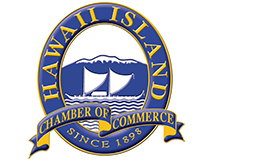At the end of 2019, no one could have imagined we’d be battling a global pandemic. That year, state revenues were at a high of $8 billion. Our unemployment rate was the lowest in the nation and we were reaching record numbers for visitor arrivals. Overnight, our expectations of a bright and promising year were crushed by the coronavirus pandemic.
These impacts were felt immediately. In response, the Department of Business, Economic Development and Tourism and the Chamber of Commerce Hawaiʻi worked together to develop innovative ways to help residents and local businesses survive. These programs included the Hawaiʻi Restaurant Card and Holiday Business Card, the Hawaiʻi Business Pivot Grant, and the Buy Hawaiʻi, Give Aloha platform.
Specifically, 335 Hawaiʻi island small-businesses were awarded funds through the Hawaiʻi Business Pivot Grant, nearly $70 million were spent by Hawaiʻi Restaurant Card recipients, and we successfully launched a new platform to showcase Hawaiʻi-made products and businesses on Buy Hawaiʻi, Give Aloha.
Going further, my administration worked with the legislature on HB1278 HD1, capping the employer contribution tax rate at a lower scheduled level. I signed the bill in early March to protect employers from higher unemployment insurance tax rates at a time when they could least afford it. I understood that temporarily reducing unemployment insurance tax rates would help mitigate some of the economic repercussions pressuring local businesses at the time.
These major initiatives- combining coordination from private and public sectors- sought to support the small, local firms and organizations that form the backbone of our communities statewide.
As our goals increasingly shift towards pandemic recovery, we’re developing solutions and programs that will combine previous priorities whilst combatting new issues of concern. One example is the realized need for broadband connectivity, since virtually everyone had to go online during the pandemic. We quickly found that individuals without connectivity were at an extreme disadvantage in finding work and participating regularly in school. The Department of Transportation is leading a pilot project to connect rural communities statewide, including Puna and Ka’u. By leveraging federal highways and broadband funding, we are working to bring secure and reliable high-speed internet access to traditionally underserved communities.
The national media have asked why we’ve done so well in handling the virus compared to other places, and I tell them it’s because of our strong sense of community. We understand that we can only be successful together. We know that what we do impacts our friends and neighbors, and that we’re willing to live with restrictions to protect us all. However, protecting everyone’s heath means staying the course because we are not out of the woods yet. We must continue to wash our hands, watch our distance, and encourage others to get vaccinated.
While our economy steadily grows and visitor rates rise, I will continue to work with Mayor Roth and the business community as we undertake other strategic recovery efforts and the gradual modification of the Reopening Strategy’s tier requirements.
Mahalo,
Governor David Y. Ige
To subscribe to the Capitol Connection, please visit: https://governor.hawaii.gov/subscribe/ https://hidot.hawaii.gov/highways/hdot-broadband/


Recent Comments